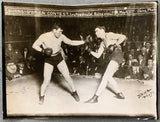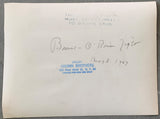BURNS, TOMMY-PHILADELPHIA JACK O'BRIEN ORIGINAL PHOTOGRAPH (PRE FIGHT-1907)
JO Sports Inc.
Regular price $400.00
HISTORY: On May 8, 1907 at Naud Junction Pavilion in Los Angeles world heavyweight champion Tommy Burns defended his title against Philadelphia Jack O'Brien. Burns prevailed winning a 20 round decision. This was the third and final fight between Tommy Burns and Philadelphia Jack O'Brien. The first Burns-O'Brien fight took place on October 7, 1904, with O'Brien winning by a six-round newspaper decision. In an article that appeared in the Tacoma Times on February 1, 1911, Burns told what happened the first time he fought O'Brien: "One afternoon I was called to the phone. 'This is O'Brien, come on around the corner a minute, will you,' said the voice. I went out and met Jack O'Brien. 'Now, look here, boy, I want you to come on and box this six rounds with me.' I was startled, because O'Brien was then rated as nearly the equal of Jim Corbett in cleverness, while I was only a green kid trying to earn bread and butter in the second and third-rate class. 'Now don't worry about getting knocked out or beat up, kid,' continued O'Brien. 'It'll be a nice six-round boxing exhibition so the crowd won't be disappointed. I'll take care of you.' Well, I trusted Jack O'Brien. I knew I couldn't beat him, but I thought if the club was satisfied with a boxing exhibition I would take O'Brien on. From the time we entered the ring until we climbed out I thought that everybody in the house had been throwing boxing gloves at me. O'Brien cut me to pieces. He had double-crossed me. It was a tough lesson, but I took my medicine and kept still." The second Burns-O'Brien bout took place on November 28, 1906. Burns, the defending World Heavyweight Champion, retained the title when the bout ended in a twenty-round draw. However, most of the people in attendance thought Burns had won the fight. The day after the match, the Los Angeles Herald reported: "There was no outcry of disapproval but a quiet sentiment prevailed throughout the house that Jack O'Brien was the lad who might give Thanksgiving today." The day before the third Burns-O'Brien fight, the San Francisco Call reported that there was going to be a conference on the morning of the fight, at which all disputed points would be decided, and it was expected that O'Brien would insist on a clean break, with no hitting in the clinches. He had demanded the same for bouts against such fighters as Young Peter Jackson and Sam Berger. The gate was $21,503. The promoter, Tom McCarey, said he paid Burns $15,000 and O'Brien $6,390. Referee Charles Eyton received $200. The day after the fight, the San Francisco Call reported: "Rugged Tommy Burns out fought Jack O'Brien for the full twenty rounds in their fight before the Pacific Athletic club tonight and was given a well merited decision after the final round by Referee Charles Eyton. From the start it was apparent to the spectators that it takes two to make a fight. O'Brien had to avail himself of every inch of the ring to be able to stall off the determined rushes of his opponent and save himself the ignominy of having a knockout charged against him at this late day in his career as a boxer. Whatever the reason, he made an unexpectedly poor showing both in stamina and hitting power and in judgment of distance. Apparently trained to the hour, from outward appearances, he seemed uncertain of his fighting powers from start to finish and was loth to put himself to the test of the sharp competition which was expected of a man of the caliber of Burns. One round was almost identical with another, Burns being always the aggressor, while O'Brien was kept on the run. Whenever O'Brien showed a willingness to mix matters, and this was at Intervals few and far between. Burns at once commenced to punish him severely. Contrary to all expectations, O'Brien was badly cut up during the progress of the fight, and at its close he was far from the gay young blade that he usually is when on parade. Burns did not show a mark as the result of the conflict. Both of O'Brien's eyes were badly cut, while his nose, which had been damaged in his last fight with Burns, also came in for a severe bombardment. The injury to his eyes would have had the effect of impairing his judgment of distance, but he used so few of his opportunities in this respect that it could hardly be called a handicap to him. A buzz of comment went about the big pavilion in which the fight was held when Referee Eyton, upon stepping into the ring, made the announcement. 'For good and sufficient reasons I declare off all bets on this contest.' Later he explained that he had done this because the betting looked bad. The odds ruled almost throughout the betting at 5 to 4, with O'Brien favorite. Some betting was done at 5 to 3, with O'Brien favorite, and as this probably did not appeal to McCarey's sense of what the odds should have been he decided to prevent the semblance of scandal in the club. The reason for installing O'Brien as the public choice was that it was believed that he had not been in condition to do himself justice In his previous fight with Burns, and that at this time he would score a decisive victory. The outcome showed that Burns' remarkable fighting spirit is too much for O'Brien at the present time, after the drain which has been made upon his vitality in the twelve years he has been in active service in the ring. The crowd, while large, fell below the expectations of the promoters. The $30,000 purse for which the men were supposed to be battling vanished into thin air and other arrangements for compensation of the fighters were made at the last moment. There was a delay before the men entered the ring and this was caused by a conference between the fighters and the management, which resulted in a new adjustment of the division of the purse. O'Brien originally was to have received $10,000 as his share, while Burns took a gamble on the size of the house and was to have been paid on a percentage basis. As there was only about $20,000 in the house there was a final adjustment of the compensation before the fighters appeared." Two days after the fight, the San Francisco Call reported: "An ugly scandal has developed over the Burns-O'Brien fight, and O'Brien, who has been held up before the public as a model both in and out of the ring, has had his reputation for honestly sadly besmirched. In addition, he must bear the ignominy of being called a craven coward. The expose came after the calling off of the bets on the fight by Referee Eyton last night, and Burns was the man to give the facts to the public. Burns told how O'Brien had visited him at his home in this city last November with the proposition that they have a return match and that O'Brien be declared the winner. Burns was so eager for a return match and at the same time «o certain that be could never get O'Brien into the ring for a square fight, he said, that he agreed to lose to O'Brien, intending to go on and win once he had the Philadelphia in front of him." Post-Fight Quotes-Tommy Burns: "They say Jack O'Brien is smart. Well, they'll say Tommy Burns is smarter now. I always knew that this fellow was the greatest faker in the business. Last December he came to my house twice on Adams street for the purpose of framing up a deal whereby he could retain his fame. He wanted me to lay down and offered me the winner's end of the purse. I wouldn't stand for it at first, but I agreed when I found out that it was the only way to get him in the ring. The last time he left my home it was with the understanding that I was to go out in the eleventh round. He gave me this line of talk: 'I know I haven't a chance in the world to beat you, Tommy, and have everything to lose. It won't hurt you so much to be defeated and it will me. I would be down and out.' I decided then and there that the chance had come to expose this man to the world and resolved to do so."-Promoter Tom McCarey: "O'Brien came to me in my office a few hours before the Mellody-Sullivan battle. . . . He submitted a proposition relative to Burns 'laying down.' I absolutely refused to consider it, but O'Brien persisted and suggested that I see Burns and feel him out on the subject. I met Burns at the ringside and Burns admitted that he had already agreed to 'lay down' in the eleventh round, at the same time asserting his intention of double crossing O'Brien. When I saw that Burns really meant to fight I agreed and it was planned to declare all bets off at the last minute and then clang the gong before O'Brien had a chance to make any sort of a break."-Philadelphia Jack O'Brien: "On the night of the Mellody-Sullivan fight I came in and met McCarey at his office. McCarey said: 'Well, I am the best friend you have, Jack.' I asked him what he meant and he told me that Burns would flip a coin to see which one of us would lay down, or that he thought Burns would go out if he received a little on the side. I asked him how much and he said he thought $2500 would be bait. I agreed that McCarey should see Burns. Another meeting resulted and McCarey brought news that Burns would lay down for $3500. It was then agreed that I was to receive 30 per cent of the gross receipts and pay Burn the $3500. . . . According to the first set of articles we were to fight straight rules. That was when Burns was to go out in the eleventh round. Later it was decided to break clean and I was to receive a decision with Burns going slow. . . . They double crossed me at the last. When I saw the jig was up I decided that there was nothing left to do but make a bluff. I merely tried to stay the limit." Offered here is an original, first generation photograph which depicts the two fighters squaring off in the ring before the start of the fight.
FULL DESCRIPTION: This is an original, first generation photo with photographer stamp for Dana in lower right corner. Bold, clear image. Clean without staining. Tiny corner creases at lower and upper right corners. No tears. 6 1/4" x 8 1/4."
Size: 6 1/4" x 8 1/4"
Condition: Very Good




